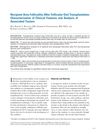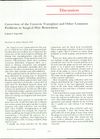Search
for
Sort by
Research
510-540 / 1000+ results
research Hair Protective Effect of Argan Oil (Argania Spinosa Kernel Oil) and Cupuassu Butter (Theobroma Grandiflorum Seed Butter) Post Treatment with Hair Dye
Argan oil and cupuassu butter can protect hair after dyeing.

research Frontal Fibrosing Alopecia: A Multicenter Review of 355 Patients
Most patients with frontal fibrosing alopecia are postmenopausal women, and treatments like finasteride and dutasteride can improve or stabilize the condition.

research Androgen Therapy in Women: A Reappraisal: An Endocrine Society Clinical Practice Guideline
The guidelines advise against using testosterone and DHEA in women for most conditions due to safety and effectiveness concerns, but suggest considering testosterone for postmenopausal women with low sexual desire.

research Systemic Steroids With or Without 2% Topical Minoxidil in the Treatment of Alopecia Areata
Steroids help hair regrowth, and minoxidil slows post-steroid hair loss, but effects are temporary.

research Intracrinology and the Skin
DHEA stimulates skin oil glands and could help postmenopausal women, with potential for acne and excessive hair growth treatments.

research Intravaginal Testosterone Improves Sexual Satisfaction and Vaginal Symptoms Associated With Aromatase Inhibitors
Intravaginal testosterone cream improves sexual satisfaction and reduces vaginal discomfort in postmenopausal women on breast cancer treatment without affecting hormone levels.

research International Society for the Study of Women's Sexual Health Clinical Practice Guideline for the Use of Systemic Testosterone for Hypoactive Sexual Desire Disorder in Women
Testosterone therapy can help postmenopausal women with low sexual desire if monitored carefully.

research The Rationale for Physiological Testosterone Replacement in Women
Testosterone replacement may help post-menopausal women with androgen insufficiency, but more research is needed on its benefits and risks.

research What Can Hair Tell Us About COVID-19?
Grey hair and baldness may be linked to COVID-19 severity, but more analysis is needed; post-infectious hair loss is related to the severity of the disease and usually recovers within 3-6 months.

research Frontal Fibrosing Alopecia: A Review
Frontal Fibrosing Alopecia's cause is unclear, affects mainly postmenopausal women, and current treatments focus on stopping hair loss rather than regrowth.

research International Society for the Study of Women's Sexual Health Clinical Practice Guideline for the Use of Systemic Testosterone for Hypoactive Sexual Desire Disorder in Women
Testosterone can help premenopausal and postmenopausal women with low sexual desire, but its long-term safety is unclear and it's not widely approved for this use.

research Low-Dose Oral Minoxidil as Treatment for Non-Scarring Alopecia: A Systematic Review
Low-dose oral minoxidil effectively treats non-scarring hair loss with some side effects like hypertrichosis and postural hypotension.

research A Pharmacogenetic Survey of Androgen Receptor (CAG)N and (GGN)N Polymorphisms in Patients Experiencing Long-Term Side Effects After Finasteride Discontinuation
Longer CAG and GGN repeats increase alopecia risk, but no significant link to post-finasteride syndrome found.

research Recipient Area Folliculitis After Follicular-Unit Transplantation: Characterization of Clinical Features and Analysis of Associated Factors
Postoperative folliculitis after hair transplants is a minor issue that doesn't relate to patient details or how much hair is transplanted.

research Gender Difference in Relationship Between Serum Ferritin and 25-Hydroxyvitamin D in Korean Adults
Men and premenopausal women in Korea show different patterns in iron and vitamin D levels, with no clear pattern for postmenopausal women.

research Androgens and the Menopause
Testosterone replacement may help postmenopausal women with sexual function and bone density, but suitable treatments are limited.

research Pregnancy and the Hair Growth Cycle: Anagen Induction Against Hair Growth Disruption Using Nourkrin with Marilex, a Proteoglycan Replacement Therapy
Nourkrin® with Marilex® may increase hair count by 35.7% in postpartum hair loss.

research Hair Restoration Surgery: Hair Transplantation and Micrografting
Hair transplantation and micrografting, used for baldness, involve moving hair follicles from hair-rich to bald areas, requiring careful procedure and post-care for success.

research Correction of the Cornrow Transplant and Other Common Problems in Surgical Hair Restoration
The document suggests fixing common hair transplant issues by combining artistic principles with plug reduction, recycling, and additional micrograft transplantation, while also potentially using arnica to help with post-operative swelling.
research Determination of Estradiol and Progesterone Concentrations in Human Scalp Hair
Hair levels of estradiol and progesterone are higher in premenopausal than postmenopausal women, but the difference isn't statistically significant, indicating the need for a better measurement method.

research Anesthetics and Platelets
The document suggests that hair loss after stopping birth control may be similar to post-pregnancy hair loss and could recur with future pregnancies.

research Climacteric Commentaries
Long-term estrogen therapy in postmenopausal women can improve certain health markers, hair loss is common regardless of hormone use, stopping estrogen doesn't increase breast cancer risk, smoking does, and a balanced BMI is linked to lower mortality.

research The Relationship Between Telogen Effluvium and Post-COVID-19 Infection at Klinik Sukma, January 2023-February 2023
Post-COVID-19 patients are at risk for hair loss.
research Evaluation of Post-COVID-19 Sequelae in Patients Attending a Pulmonology Clinic in the Metropolitan Region of Goiânia
Post-COVID-19 patients often experience musculoskeletal issues, fitness decline, behavioral changes, chest pain, cough, hair loss, and nervous system problems.

research Ninjin'yoeito Effective for Hair Loss in Post-COVID-19 Patients: Two Cases
Ninjin'yoeito, a Japanese medicine, helped stop hair loss and improved mood in two post-COVID-19 patients.

research Facial Hair Transplantation: Beard and Moustache Reconstruction
Facial hair transplants are generally successful, with hair growth beginning around 3 months post-surgery.

research Hair Transplantation and Micrografting for Oral and Maxillofacial Surgeons
Hair transplantation and micrografting are effective for cosmetic facial enhancement, requiring careful technique and postoperative care for successful outcomes.

research Aseptic Necrosis of Warts Instead of Lymphangitis
Some people may naturally have beaded lines on their skin that are more visible with certain treatments, and hair loss similar to post-pregnancy can occur after specific diet and therapy.

research Interrelationships Between Skin Structure, Function, and Microbiome of Pregnant Females and Their Newborns: Study Protocol for a Prospective Cohort Study
The study aims to understand the skin and hair characteristics of mothers and their babies, and how these may affect newborns' skin health and mothers' postpartum hair loss.